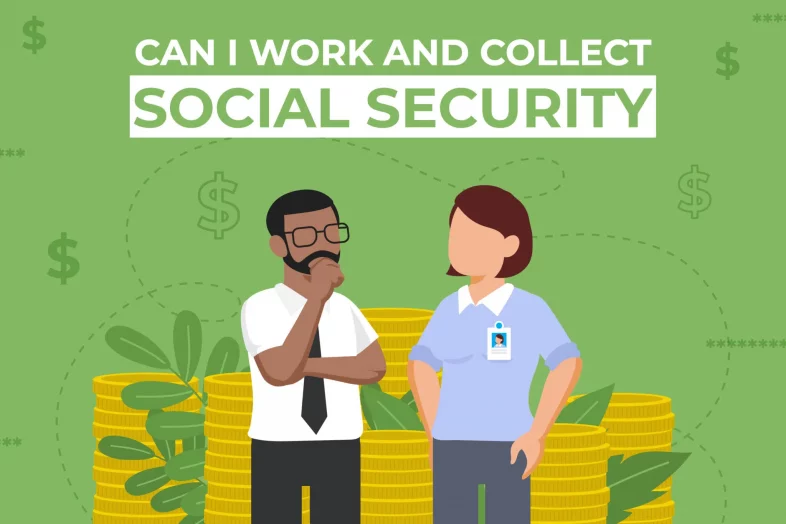About 64% of Americans have not saved enough for retirement, and about half of them may not save anything once they reach retirement age.
The pandemic has worsened some bleak statistics from a recent GoBankingRates poll. Many people have lost their jobs and are several months late on their bills.
Given that such a large percentage of Americans are trying to accumulate savings for retirement, it is clear that many of these people will have to work well beyond their full retirement age. And it is quite possible, in some capacity, for the rest of your life.
This harsh reality begs the question: can I work and get social security?
As with most things, the answer to this question is complex and depends on your situation. However, by the end of this article, you will be able to answer the question for yourself and your loved ones.
Can I work and get social security? Let’s figure it out.
What is Social Security?
The law was signed into law in 1935 as part of the New Deal. The original goal of the social security program was a retirement plan for workers aged 65 and over. The program allowed people to have a steady income after retirement and many to retire.
Although Social Security began as a purely retirement plan for workers, provisions were added over the next 40 years to include survivor benefits, disability insurance, Medicare, and Supplemental Insurance Income (SSI). These additions have helped provide income for the families of deceased workers, people with disabilities, and health insurance for beneficiaries.
Today, approximately 63 million people in the United States receive Social Security benefits, or about one in five Americans. Of these people, one in three is disabled, dependent, or survivor.
How does social security work?
Social security is one of the most confusing areas of personal finance for people, and it can be difficult to figure out how to decide whether to apply for benefits.
There are also concerns about the ability to pay and social security shortages, or the fact that more benefits are paid than taxes are received. However, we will postpone this discussion until another day.
Knowing how Social Security works is important to help us know if you can work while collecting benefits.
At what age can you get social security?
For most, Social Security benefits come in the form of retirement income. For those who are not disabled, you can start receiving Social Security benefits no earlier than 62 years old (60 years for a widow or widower). However, if you choose to start receiving benefits earlier, they will decrease by a small percentage each month until you reach full retirement age.
The full retirement age, or the age at which you will receive full benefits according to your situation, is 66 years and 2 months for those born in 1955, with a gradual increase to 67 for those born in 1960 or later.
There is also an incentive to defer your benefits until you reach full retirement age. You can postpone your benefits until you reach the age of 70, after which the benefit no longer increases and therefore there is no reason to postpone social security benefits.
For example, those who reach full retirement age at 66 years and two months but stay up to 70 years old will receive 132% of what they would have received if they started painting at full retirement age.
How are benefits calculated?
Social Security calculates benefits using two factors: 1) the amount you earned in your working career and 2) the age at which you start receiving benefits.
SSA uses the highest 35 years of earnings in your working career to calculate your benefits. This calculation gives your Average Indexed Monthly Earnings (AIME), which they use to calculate your benefits. Note, however, that years when you did not receive income are also included in this calculation, which can seriously affect your benefits if you have not worked for many years.
The AIME is then divided into three “inflection points” included in the formula that gives you your monthly full retirement benefit or your primary insurance coverage (PIA).
Your PIA increases or decreases depending on the age at which you start receiving benefits. Cost of living adjustments also affect benefits.
Calculating AIME and PIA is very confusing and complex, so those hoping to get an estimate of their monthly Social Security benefits can do so using the online calculators offered on the Social Security Administration (SSA) website.
Can I work and get social security?
Now that you know when you can start getting Social Security, how your benefits are calculated, and possibly the approximate amount you can expect to receive, we can begin to address the question posed at the beginning of this article.
Can I work and get social security?
The simple answer is yes, but the difficult answer is yes, with one caveat. While it is possible to work and get social security, the amount you can earn and the effect on your benefits depends on several factors.
How much can you earn and still receive benefits?
The moment you start receiving Social Security retirement benefits, the Social Security Administration considers you retired. Whether your earnings affect your Social Security benefits depends on your age.
If you have reached your full retirement age (66 + 2 months to 67 depending on your year of birth), then no matter how much you earn while working, your benefits will not decrease. In other words, once you reach full retirement age, you can work as much as you want without compromising your social security.
However, if you are under full retirement age, there is a limit on your earnings that does not reduce your benefit. For 2021, the annual limit for those receiving Social Security retirement benefits is USD 18,960…
Therefore, if you are under full retirement age and receive Social Security, you can work and earn up to $ 18,960 per year in addition to your benefits without losing any of those benefits.
However, for every $ 2 you earn in excess of the annual limit, $ 1 will be deducted from your payments.
For example, let’s say you earned $ 19,960 this year, which is $ 1,000 more than the annual limit. If this happens, you will lose $ 500 in Social Security benefits over the course of the year due to additional earned income. Of course, in this scenario, you get $ 500 in income, but you have to decide for yourself whether the job is worth the loss of benefits to make that money.
To complicate matters further, there are special rules for those who choose to work while receiving benefits the year they retire. For these people The income limit for 2021 is $ 50,520., with $ 1 deducted for every $ 3 earned over this limit.
Also, in the above scenario, SSA only counts your earnings in the month before you reach full retirement age, not your full year earnings.
What is earned income?
As you can see, the annual cap on the amount you can earn while still receiving full Social Security benefits is relatively low, and so you might be wondering what SSA considers earned income.
Of course, income from work is taken into account, as well as bonuses, vacation pay and commissions. However, if you are self-employed, SSA counts your net income as earned income.
On the other hand, the SSA does not count pensions, investment income, interest, veterans or government retirement benefits or annuities as earned income.
As you can see, SSA only counts income from work or self-employment when determining if your benefits are decreasing.
Can I work and get social security? Yes, but be careful not to exceed the annual limit that applies to your situation, or you will lose some of your benefits.
Do you have to work and get social security?
Now that you know you can work and still get social security, the question is, should you?
As with most things, it depends on the circumstances.
Remember, the annual earned income cap only affects your Social Security benefits until you reach full retirement age. If you have reached full retirement age, you can work as long as you like, but this income will not affect your benefits.
If you are under full retirement age and are receiving Social Security retirement benefits, consider your annual income limits and whether you expect to earn more than the limit.
If you go over the limit slightly, the impact on your benefits will be minimal. However, if you go over the limit significantly, the additional income you receive will most likely not outweigh the cut in benefits.
Let’s say you want to keep working and earn significantly more than the annual earnings limit above. If this is the case, you should consider postponing your retirement benefits until you reach full retirement age and your earnings do not affect your benefits.
You may still not know if it makes sense to work and get social security. If so, consider hiring a retirement consultant, a financial advisor who specializes in helping people approaching retirement age. You will find that many retirement advisors have received Certified Retirement Income Specialist status, so they can help you determine the best time to apply for Social Security based on your circumstances.
You can also visit the Social Security Administration website for a list of Social Security resources and help you decide which is best for your situation.
Final thoughts
Social Security is a complex but important component of every American’s long-term financial plan.
While not meant to be a complete retirement plan, social security remains a key element of retirement benefits and earned benefits for those who have worked throughout their lives. Social security is becoming even more important for people with little retirement savings, but they may not be enough to comfortably get by without earned extra income.
Fortunately, you can work collecting Social Security benefits up to a certain annual cap, after which SSA will cut your benefits based on how much you exceed the cap. Thus, if you are at full retirement age, additional earnings will not affect social security.
Can I work and get social security?
Yes, you can, but only you can decide if you should.
This post originally came from you money geek.


